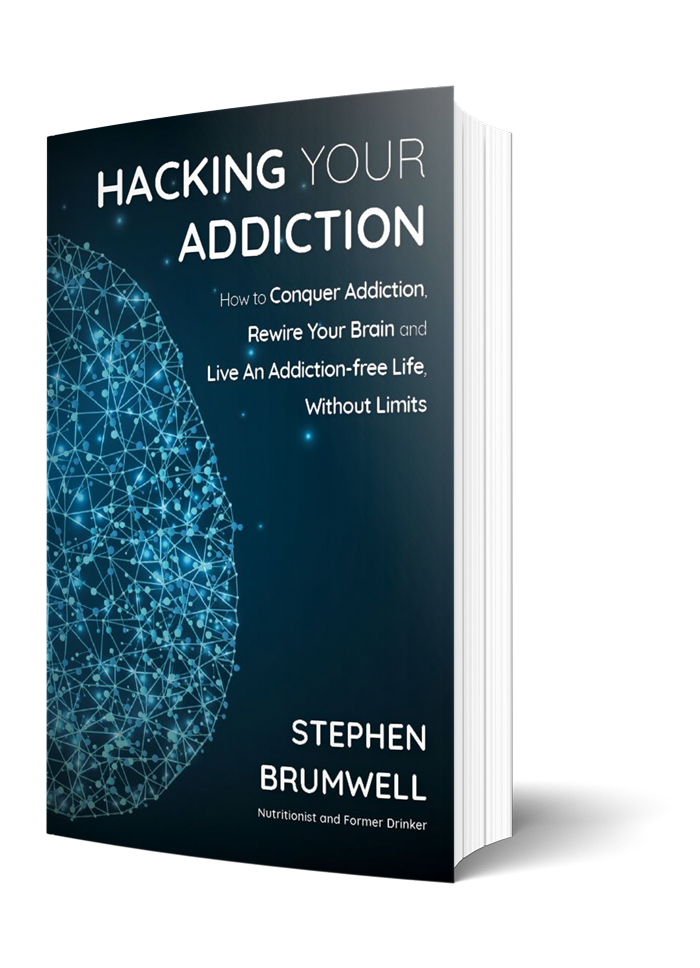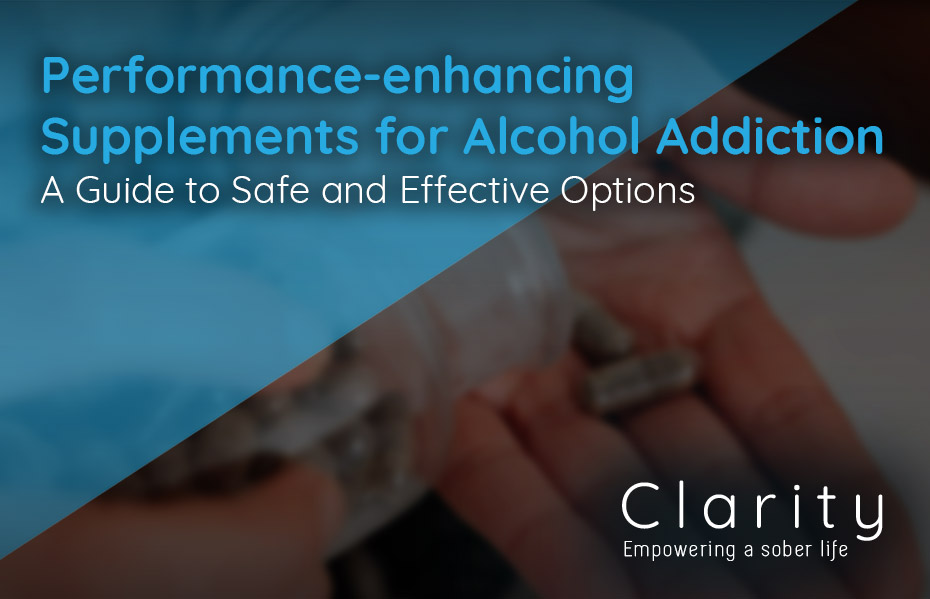What To Know
- Withdrawal symptoms (such as anxiety, depression and cravings) can be intense and often lead to relapse, but supplements can help alleviate these symptoms and support a successful recovery.
- Utilizing a vitamin B complex supplement can effectively replenish the body's B Vitamin levels, aiding in the reduction of deficiency-related symptoms and enhancing overall wellness.
When it comes to alcohol addiction sobriety, have you ever considered the use of Performance-enhancing Supplements to support your journey?
Recovery from alcohol addiction can be challenging and ongoing, and people often look for ways to enhance their performance and achieve sobriety successfully. Performance supplements in sobriety can play a significant role in supporting individuals who are recovering from alcohol addiction, alongside other treatments such as therapy, counselling, and medication.
In this article, we will explore safe and effective performance-enhancing supplements that can support your alcohol addiction recovery journey. While supplements are not a cure for alcohol addiction, they can be used in combination with other treatments to help you achieve sobriety more easily.
Understanding Alcohol Addiction and Supplementation
Supplementing for alcohol addiction recovery can help in many ways. The most common reason is nutrient deficiencies, which are often a result of poor diet, impaired absorption and increased excretion of essential vitamins and minerals.
More on Alcohol Addiction and Nutrient Deficiencies here.
Using performance-enhancing supplements through alcohol sobriety can also help us manage and support area areas as we progress through our recovery journey, some of these include:
- Alcohol Withdrawal Symptoms: Withdrawal symptoms (such as anxiety, depression and cravings) can be intense and often lead to relapse, but supplements can help alleviate these symptoms and support a successful recovery.
- Support Liver Health: Chronic alcohol consumption can damage the liver and increase the risk of liver disease. Supplementing with specific nutrients such as N-acetylcysteine (NAC) can help support liver function and reduce the risk of liver damage.
- Supports Mental Health: Chronic alcohol consumption can lead to cognitive impairment and mental health issues such as depression and anxiety. Supplementing with certain nutrients and herbs can help improve mood, reduce anxiety, and enhance cognitive function.
Of course, this list isn’t overly extensive, and excessive alcohol intake impact other core areas including our immune health and sleep – and supplements can help with this too.
Performance-enhancing Supplements for Alcohol Addiction Recovery
Using performance-enhancing supplements in addiction recovery can be a game-changer, especially during the early stages of sobriety.
Even using something as simple as protein powder can help better regulate alcohol cravings, and stabilise our mood and energy.
Learn more about Protein Powder During Addiction Recovery here.
That all being said, let’s dive into some of the most effective supplements that could help your sobriety journey.
1. N-Acetylcysteine (NAC)
N-acetylcysteine (NAC) is a natural supplement that has been shown to support liver function and reduce cravings for alcohol. Studies have also shown that NAC can help reduce withdrawal symptoms, including anxiety, depression, and insomnia.
NAC works by replenishing the body’s supply of glutathione, a powerful antioxidant that helps protect against oxidative stress caused by alcohol consumption. (Mardini & Kip, 2021; Shen et al., 2020)
Optimal dose: Between 1,000 – 2,400 mg/daily.
More on NAC here – This page will also list some recommendations on Amazon to purchase.
2. L-Theanine
L-Theanine is an amino acid commonly found in green tea and is most associated with its ability to reduce the jitters that come with caffeine.
Interestingly, it has also been shown to reduce stress, anxiety, and depression, making it an effective supplement for those in recovery.
L-Theanine also helps improve focus and concentration, which can be beneficial for individuals in early sobriety who may be struggling with cognitive impairment. (Hidese et al., 2019).
Optimal dose: 100 – 200 mg/daily.
3. B Vitamins
B Vitamins are crucial elements of performance-enhancing supplements, playing a vital role in healthy energy production for improved physical performance and body functioning.
The consumption of alcohol can lead to a significant depletion of these essential vitamins, resulting in symptoms like fatigue, weakness, and cognitive impairment. Utilizing a vitamin B complex supplement can effectively replenish the body’s B Vitamin levels, aiding in the reduction of deficiency-related symptoms and enhancing overall wellness. (Barr, 2018; Raffaelli et al., 2019)
Read more about the most important B Vitamins to consider when it comes to B VItamin nutrient deficiency.
4. Protein Powder
Protein powder can help support muscle growth and repair, which is beneficial for individuals recovering from alcohol addiction. Chronic alcohol consumption can lead to muscle wasting and reduce muscle mass, which can affect overall strength and physical function.
Protein is an essential nutrient required for muscle synthesis, and supplementing with a quality protein powder, such as UM Sports Platinum Blend, can provide a convenient and easy way to increase protein intake.
Research has shown that using protein as performance-enhancing supplements can improve muscle protein synthesis and enhance muscle growth in individuals recovering from alcohol addiction (Bianco et al., 2014). However, individuals should consult with a healthcare professional before starting any supplement regimen.
Optimal Intake: Between 1.2-1.8 grams per kilogram of body weight.
Learn more about optimising your protein intake here.
5. Magnesium
Magnesium is a biggie, as Alcohol consumption can also deplete magnesium levels, leading to muscle cramps, anxiety and insomnia.
When we supplement with Magnesium to improve our performance in alcohol recovery, we can help reduce anxiety, and also improve our sleep quality.
Anxiety can be a big one when it comes to getting sober, learn more about the Connection between Alcohol and Anxiety here.
Optimal dose: 400 – 600 mg/daily.
Read my comprehensive guide on Magnesium: Understanding its Role and Use in Addiction.
6. Zinc
Zinc is another mineral like Magnesium that can be depleted rapidly with chronic alcohol consumption.
Low Zinc can be common in alcohol abuse individuals, which often results in a weakened immune system, impaired wound healing, and overall slower recovery (Pavuluri et al., 2022).
When we supplement with Zinc, we may help to rapidly restore Zinc levels, resulting in an improvement in immune function, and our overall ability to recover and perform better.
Optimal dose: Daily intake is approximately 11 mg (males) and 8 mg (females).
Read my comprehensive guide on Zinc: Understanding the Critical Nature of Zinc and Zinc Deficiency in Alcoholism
Safety Considerations for Performance-enhancing Supplements
While performance-enhancing supplements can be beneficial for alcohol addiction recovery, it is essential to consider their safety.
Here are some safety considerations to keep in mind when taking supplements, or even before purchasing them beforehand.
- Consult with a Healthcare Professional: Before taking any supplement, it is important to consult with a healthcare professional, especially if you have any underlying medical conditions or are taking prescription medication.
- Purchase from Reputable Brands: To ensure the quality and safety of supplements, it is important to purchase them from reputable brands that follow good manufacturing practices. Psst. If you’re looking for a premium protein powder brand that ticks all the boxes, give UM Sports a go! use code CLARITY for 15% OFF.
- Follow Dosage Instructions: Taking too much of a supplement can be harmful to your health. It is important to follow the dosage instructions on the supplement label or as directed by a healthcare professional.
Frequently Asked Questions
Are there other performance-enhancing supplements you recommend for alcohol addiction recovery?
These I consider the base foundational supplements, but if you want to stretch further, you could also consider Glycine and Milk Thistle. Both of these ingredients can help with liver health and various detoxification processes associated with liver damage.
Can performance-enhancing supplements alone treat alcohol addiction?
They can be very beneficial in recovery, but I consider them more as tools than one-size-fits-all solutions. It’s crucial to consult with a healthcare professional before starting any supplementation routine, especially post-alcohol.
Can Ashwagandha help with alcohol addiction?
Ashwagandha is known for stress-reducing properties, and stress is a big deal in early sobriety. Given this information, Ashwagandha may be beneficial to add to your performance-enhancing supplements toolkit.
The Takeaway
Alcohol addiction recovery can be a challenging journey, and performance-enhancing supplements can be an effective tool to support your performance. Supplements such as N-Acetylcysteine, L-Theanine, and UM Sports Protein Powder are just a few of the many safe and effective supplements available.
However, it is essential to consider their safety and consult with a healthcare professional before taking any supplement. By incorporating supplements into your sobriety journey, you can enhance your performance and achieve long-term recovery.
If you have any feedback regarding this article, reach out. Help Clarity reach more people and quit addiction by following us on Instagram, it’s also the perfect place to message us and ask questions!

Get the “Sober Tips” Newsletter in your inbox today.
A rapidly growing email list that provides the highest quality FREE sober resources and tips to live an addiction-free life, without limits.
Absolutely no spam. Just quality information to help you live your most limitless sober life.
References
- Barr, S. I. (2018). Functional foods in recovery from alcoholism: Nutritional, biochemical and pharmacological aspects. Alcohol and Alcoholism, 53(3), 292–299. https://doi.org/10.1093/alcalc/agx102
- Bianco, A., Thomas, E., Pomara, F., Tabacchi, G., Karsten, B., Paoli, A., & Palma, A. (2014). Alcohol consumption and hormonal alterations related to muscle hypertrophy: a review. Nutrition & Metabolism, 11(1), 26. https://doi.org/10.1186/1743-7075-11-26
- Hidese, S., Ogawa, S., Ota, M., Ishida, I., Yasukawa, Z., Ozeki, M., Kunugi, H. (2019). Effects of L-Theanine administration on stress-related symptoms and cognitive functions in healthy adults: A randomized controlled trial. Nutrients, 11(10), 2362. https://doi.org/10.3390/nu11102362
- Mardini, A., & Kip, K. E. (2021). N-Acetylcysteine (NAC) supplementation in the management of substance use disorders: A systematic review. Advances in Therapy, 38(3), 1216–1230. https://doi.org/10.1007/s12325-020-01514-1
- Pavuluri, P., Jangili, S., Ryakam, L., Vadakedath, S., Tummalacharla, S. C., Kondu, D., & Kandi, V. (2022). The Activities of Zinc and Magnesium Among Alcohol Dependence Syndrome Patients: A Case-Control Study From a Tertiary Care Teaching Hospital in South India. Cureus. https://doi.org/10.7759/cureus.24502
- Raffaelli, M., Vitale, J. A., Baldassarre, R., Petrocchi, C., & Paoli, A. (2019). Zinc status in athletes: Relation to diet and exercise. Nutrients, 11(5), 1022. https://doi.org/10.3390/nu11051022
- Shen, H., Li, R., Li, J., Li, N., Li, Y., & Ye, J. (2020). N-Acetylcysteine supplementation for prevention of liver toxicity in patients receiving chemotherapy treatment: A systematic review and meta-analysis. Nutrients, 12(11), 3337. https://doi.org/10.3390/nu12113337
Related Articles

Former drinker, Nutritionist, Biohacking enthusiast, self-experimenter, research fanatic, and self-taught writer, Stephen immerses himself deep into the literature of human optimisation and better understand the nature of addiction. His goal is to help people take control of their addiction, reset their cravings, unscramble their broken brain circuitry and use actionable strategies that work ten times better than anything else.

